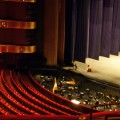Courtney: So theatre is a big thing in this city, quite a big thing. We have the Fringe Festival coming up, here in Montréal. You are affiliated with the theatre, especially this new theatre that's going to be built-or is currently being built and will be ready by September. What are you going to be doing with this theatre?
Walter: Well, I'm going to be the house manager of this theatre, meaning that I will be essentially the right-hand man of the owner, responsible for things like bookings, making sure the shows go off pretty smoothly, also be working hand-in-hand with the publicists, to make sure all the events are promoted properly and listed properly in the paper. I'm very excited; it's a vaudeville theatre. There's nothing like it in Montréal. Courtney: Okay, so explain to me "vaudeville," the term "vaudeville." Walter: Well, vaudeville theatre, I think it came about-oh, I don't know, you might know this better than I do-but somewhere in the early twentieth century, I'd imagine. Maybe a little earlier. The idea was the cabaret, so a sequence and variety of acts on stage. None more than fifteen minutes, really. So you have comedy, followed by a freak show, followed by a dance performance, followed by a circus performer. The music in between, and just whatever. If it's live, if it's art, if it's entertainment, it can go into the vaudeville show. If it's worthy, if it can get someone's attention for fifteen minutes, put it in the cabaret. Another aspect of the vaudeville theatre is that it's very close, you're very close to the audience members and the performers. Courtney: So do they participate? The audience, I mean.
Walter: Yeah, audience participation is encouraged, which is again a little bit different from other traditional or sort of status quo venues right now. This theatre is being designed to minimize the distance between audience and performer. We want everybody very close and we want you to be able to smell the performers.
Courtney: Right, interesting. So I think vaudeville-to add on to what you were saying before-stemmed from the culture in France around that time period, the early twentieth century, or the 1910s, 1920s. I think you're right in a sense that there's just-often people would call it a, you know, just a big sort of circus performances, a continual parade of performances passing in and out, where often you would have all kinds of freak people, they were coined as "freak people." It's politically incorrect to use today, "freaks," the term "freaks." That's what they were known as back then. You had the small people, the large people- Walter: Bearded ladies. Courtney: Bearded ladies, the people with extra limbs, etc. Now, you're not going to have any of these kinds of people. Walter: Well, unless they want to come and show up and perform. You know, that's up to them, but we're not doing it as traditionally as say, in the past. It's not going to be just some carnival sideshow. We're talking about a major space on St. Catherine Street in Montréal, so there has to be definitely a venue for more traditional acts. I mean, there'll be musical acts, they will be throwing concerts, we'll be throwing drama performances, actual theatre productions. It'll be a very malleable space, where you could have a punk-rock band rocking out on the main stage and then a fire breather swinging on a trapeze up above, on the roof. So basically we just want to provide an antidote to two-dimensional entertainment. Anything you see on a screen, such as television or movies, we want to make all our entertainment live.

